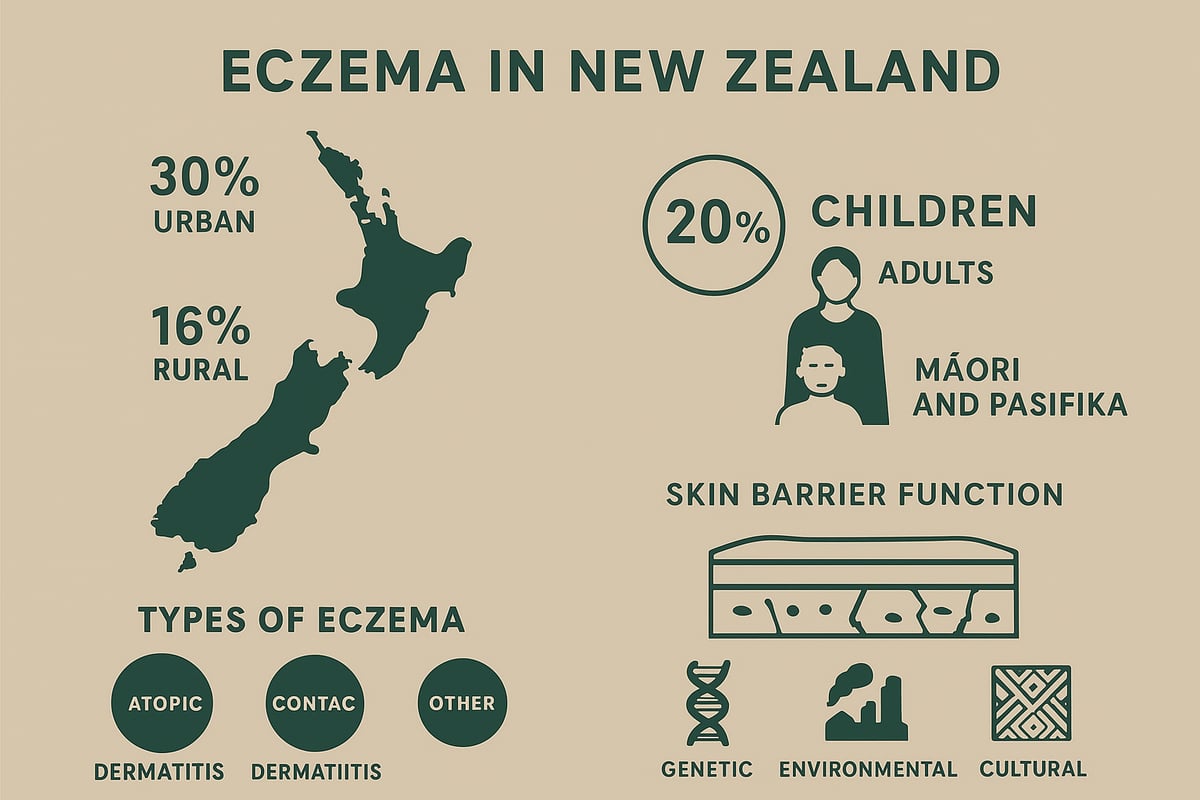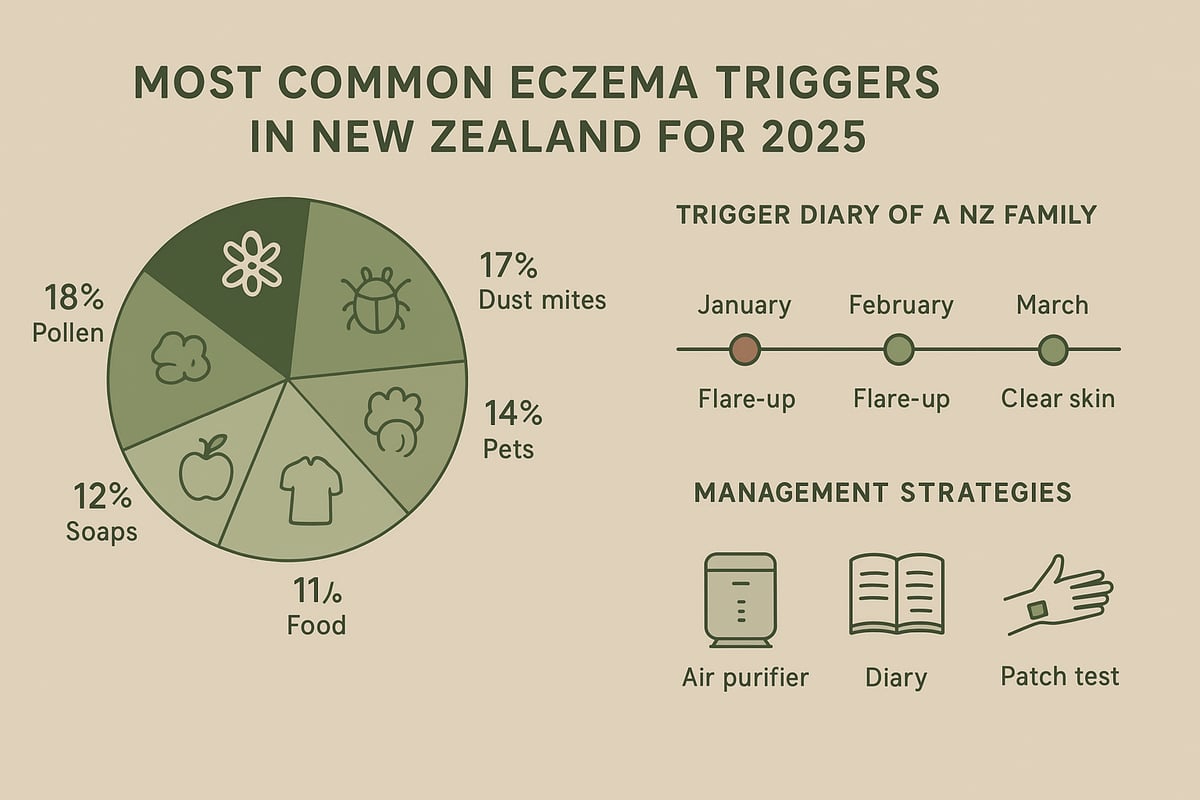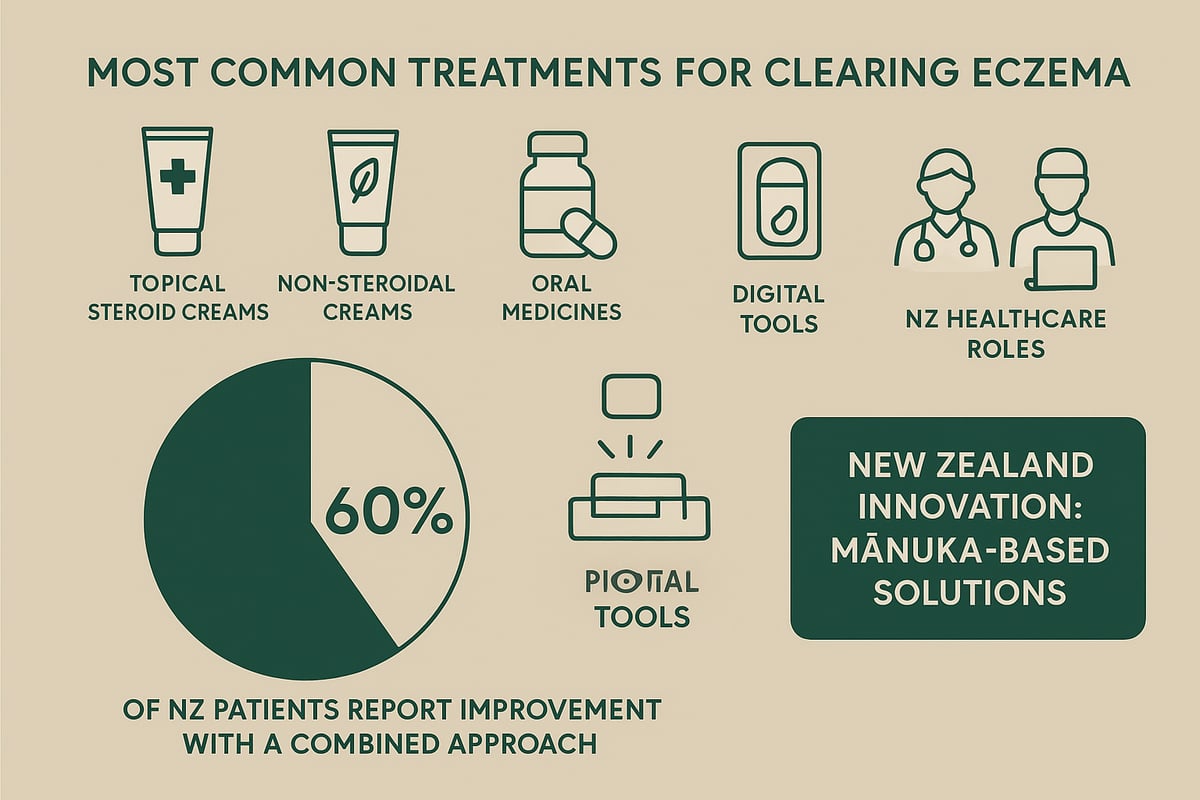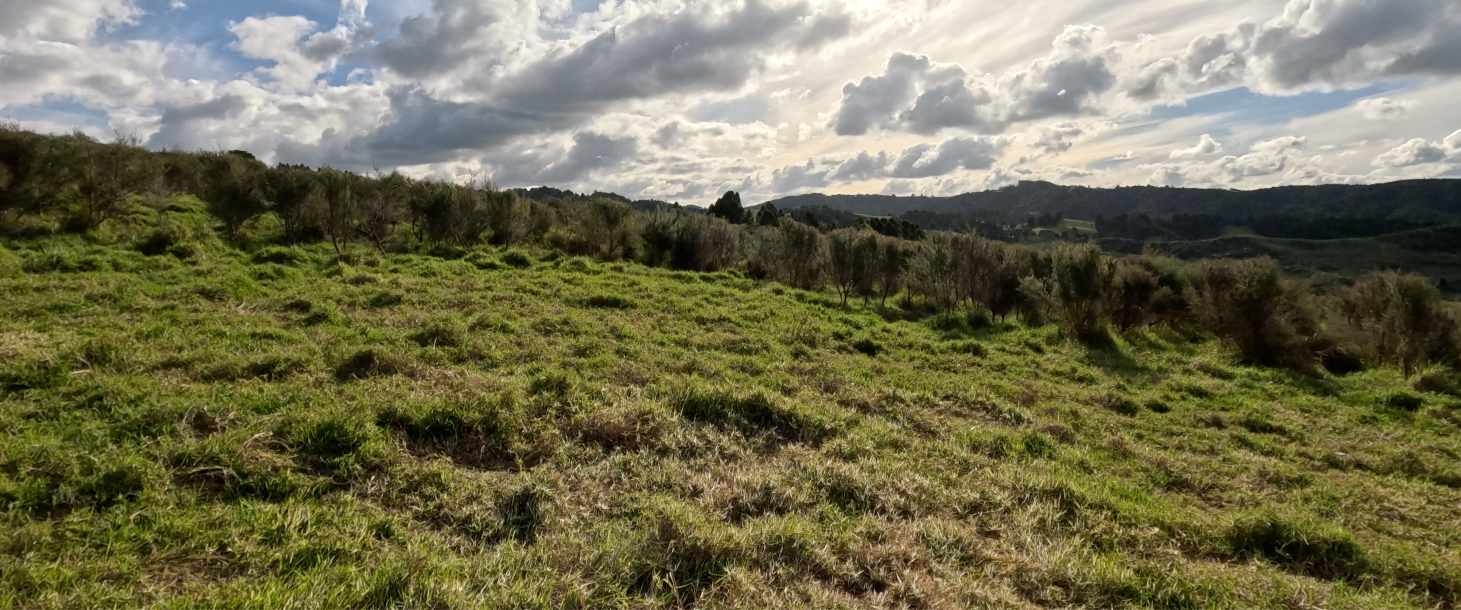
The Essential Clearing Eczema Guide for 2025
Eczema is on the rise in 2025, affecting more children and adults across New Zealand than ever before. Many families face daily struggles with itching, discomfort, and the emotional toll eczema brings.
But there is hope. With scientific breakthroughs and innovative natural remedies emerging from New Zealand, clearing eczema is now more achievable. This guide shares the latest knowledge, expert tips, and new options to help you manage and reduce symptoms.
We will cover what causes eczema, the newest treatments, daily routines, natural solutions like local Mānuka extracts, and practical strategies for prevention. Let’s begin your journey to calmer, healthier skin.
Understanding Eczema in 2025: Causes, Types, and Trends
Eczema remains a persistent challenge for many Kiwis, with rates rising across all age groups. Understanding the root causes and current trends is the first step towards clearing eczema effectively and regaining comfort.

The Latest Science on Eczema
Eczema, also known as atopic dermatitis, is a chronic inflammatory skin disorder that disrupts the skin’s natural barrier. Recent research confirms that both genetics and environment play powerful roles in triggering and sustaining eczema, making clearing eczema a complex journey.
There are several types of eczema, including atopic dermatitis, contact dermatitis, and nummular eczema. Atopic dermatitis is the most common, especially among children. According to the Childhood eczema prevalence in New Zealand, around one in three New Zealand children are affected, with even higher rates seen in Pacific communities.
Living with eczema impacts far more than just the skin. Children can miss out on sleep, struggle at school, and families may feel ongoing stress. Adults report discomfort at work and emotional distress. New scientific insights point to a weakened skin barrier and immune system dysfunction as key elements in the cycle of inflammation.
Take, for example, a young child in Auckland who has struggled with persistent eczema since infancy. Flare-ups disrupt sleep and family routines, causing emotional strain for everyone involved. For these families, clearing eczema is not just about symptom relief but restoring quality of life.
New Zealand-Specific Eczema Trends
New Zealand’s unique environment shapes the experience of eczema. High pollen counts, humidity, and shifting climates can all trigger flare-ups. For many, clearing eczema means adapting to these local conditions and understanding seasonal changes.
Māori and Pasifika populations face higher rates of eczema, influenced by both genetic factors and cultural perspectives on health. Urban areas often have better access to specialists, while rural families may encounter barriers to care. This urban-rural divide can affect early diagnosis and ongoing management.
Another trend emerging in 2025 is the rise of adult-onset eczema, as reported by the NZ Ministry of Health. More adults are seeking help for new or worsening symptoms, highlighting the importance of ongoing awareness and education.
For every New Zealander living with eczema, the journey toward clearing eczema involves recognising triggers, embracing the latest science, and seeking support tailored to their unique environment and background.
Identifying and Avoiding Eczema Triggers
Pinpointing and managing the right triggers is the backbone of clearing eczema for many Kiwi families. Eczema triggers can be sneaky, shifting with the seasons, age, and even where you live in New Zealand. Understanding what sets off your skin is the first step toward lasting relief.

Common Triggers in 2025
In 2025, the list of eczema triggers continues to grow. Environmental factors like pollen, dust mites, and pet dander are widespread in New Zealand, especially during spring and summer. Sudden climate changes, such as cold snaps or humid heat, also play a role.
Chemical irritants are another big culprit. Soaps, detergents, fragrances, and even some natural topical products can disrupt the skin’s barrier. For those aiming at clearing eczema, being cautious with household and personal care items is crucial.
Dietary triggers are controversial. While foods like dairy, eggs, and gluten can aggravate eczema for some, not everyone reacts the same way. It’s best to track symptoms and consult a professional before making dietary changes.
Stress and emotional factors make a huge impact. School exams, work deadlines, or family tensions can make itching and flare-ups worse. The type of clothing matters too. Wool and synthetic fabrics often irritate sensitive skin, whereas cotton and bamboo are gentler choices.
Emerging triggers in 2025 include increased screen time, exposure to pollution, and microplastics in the environment. These modern factors, combined with traditional ones, make it even more important to keep a close eye on patterns.
Want to see how this plays out in real life? Check out this eczema trial week-by-week results diary from a New Zealand family. Their experience highlights how everyday exposures can impact clearing eczema.
Strategies for Trigger Management
Tackling eczema triggers is about being proactive, not just reactive. Start by keeping a detailed symptom and exposure diary. Note down what your skin comes into contact with, what you eat, and when flare-ups occur. Over time, patterns become clearer, making clearing eczema more achievable.
Allergen-proof your home by using dust mite covers on bedding, running air purifiers, and washing soft toys regularly. Simple changes like switching to fragrance-free detergents and patch testing new skincare products can make a big difference.
Collaborate with healthcare professionals for allergy testing and advice. Your GP or dermatologist might recommend patch testing to identify specific chemical triggers. If you’re unsure, don’t hesitate to ask for help—eczema clinics and support groups across New Zealand are ready to guide you.
Remember, clearing eczema is a journey. Staying aware of triggers and acting early can transform daily life for you and your whānau.
Evidence-Based Treatments for Clearing Eczema
Finding the right evidence-based approach to clearing eczema can feel overwhelming. Thankfully, advances in 2025 have brought new hope, combining proven therapies with innovative care. Let’s look at what’s working best for New Zealanders today.

Latest Medical Treatments
Medical treatments for clearing eczema have evolved, offering more options than ever for both children and adults. The most common starting point remains topical corticosteroids, which rapidly reduce inflammation and itching. However, long-term use can bring risks such as thinning skin and withdrawal symptoms. For a balanced look at benefits and concerns, see Skin steroid cream pros and cons.
Non-steroidal creams, like calcineurin inhibitors and PDE4 inhibitors (crisaborole), are now widely used for sensitive areas or when steroids are not suitable. These creams help with clearing eczema by calming the immune response and reducing flare-ups.
Oral antihistamines are sometimes prescribed for itch relief, while severe cases may benefit from injectable biologics such as dupilumab or immunosuppressants. Light therapy (phototherapy) remains a safe and effective method for stubborn eczema, especially in supervised clinical settings.
Wet wrap therapy, often used in NZ hospitals, involves applying damp bandages over medicated skin to boost treatment absorption and quickly settle flares. According to the NZ Dermatology Journal (2024), 60% of patients report better outcomes when using a personalised combination of these treatments for clearing eczema.
| Treatment Type | Typical Use Case | NZ Notes |
|---|---|---|
| Topical corticosteroids | Acute flares | Use with care, monitor side effects |
| Non-steroidal creams | Sensitive areas, maintenance | Suitable for long-term use |
| Biologics | Severe, resistant eczema | Specialist prescription only |
| Light therapy | Moderate to severe, hospital | Available in major NZ centres |
| Wet wrap therapy | Rapid relief, children | Hospital and home-based |
Integrating Professional Care
Clearing eczema is rarely a solo effort. Knowing when to see a dermatologist or eczema specialist is crucial, especially if symptoms persist despite standard treatments. In New Zealand, GPs are the first port of call and can refer patients to dermatology clinics or hospital services for advanced therapies.
Nurses and eczema clinics support families with education, wet wrap demonstrations, and ongoing skin care advice. Regular reviews help ensure prescriptions are up to date and that treatment plans evolve with a patient’s needs.
Telehealth has become a game changer in 2025, making it easier for rural and urban families alike to access expert advice and digital eczema management tools. These online platforms can help track symptoms, remind users about medications, and connect them directly with NZ-based specialists.
The key to clearing eczema lies in a collaborative, evidence-based approach. By combining the right treatments with professional care, most people in New Zealand can achieve better control, fewer flares, and improved quality of life.
Natural and Alternative Solutions: Spotlight on Mānuka Extracts
Natural approaches to clearing eczema are gaining momentum in New Zealand, as more people seek gentle, effective alternatives to traditional steroid creams. Many families are turning to botanicals, hoping to find relief from stubborn itching and inflammation without harsh side effects.
The Rise of Natural Remedies
Interest in natural remedies for clearing eczema has surged, with families searching for safer, steroid-free options. Traditional ingredients like colloidal oatmeal, coconut oil, and aloe vera are well known for their soothing properties. These plant-based solutions can help calm irritated skin and may offer comfort during flare-ups.
- Colloidal oatmeal: Forms a protective layer, locking in moisture and reducing itch.
- Coconut oil: Offers mild antibacterial benefits, but may not suit everyone.
- Aloe vera: Naturally cooling and hydrating, though some people can react to it.
- Mānuka extracts: Known for unique healing properties, especially in NZ.
While these natural remedies can support clearing eczema, evidence for their effectiveness varies. Some people find significant relief, while others notice little change. It is crucial to patch test new products, as even natural ingredients can cause allergies. Regulation of these remedies is limited, so choosing reputable brands is important for safety.
Families often combine natural options with medical treatments, aiming for a balanced approach to clearing eczema. Keeping a diary of symptoms and responses can help identify what works best for your skin.
Waipu Extracts: Full Spectrum Mānuka for Eczema Relief
Mānuka, a native New Zealand plant, is gaining global recognition for its powerful properties in clearing eczema. Waipu Extracts has pioneered a world-first, full spectrum Mānuka extract using a proprietary method that preserves the plant’s anti-inflammatory, antimicrobial, and skin barrier benefits.

What sets this extract apart?
- Proprietary extraction: Maximises healing compounds, ensuring consistent potency.
- NZ made: Sourced and produced locally, supporting Kiwi innovation.
- Safety: Gentle enough for children, adults, and sensitive skin types.
Customers report impressive results: “Cleared up my son’s eczema without steroid cream,” one parent shares. Many found success with Waipu Extracts after other products failed, appreciating its ability to soothe, calm, and support long-term skin health.
To use, simply apply a drop or two to affected areas, twice daily. It absorbs quickly, leaving no residue, and is safe for daily routines. The product’s credibility is backed by Judge.me medals and strong NZ-made recognition.
Science supports Mānuka’s role in clearing eczema, with studies highlighting its effectiveness in reducing inflammation and supporting the skin barrier. Pricing starts from $29, with free NZ express shipping, making it accessible for families nationwide.
Choosing a natural solution like Waipu Extracts can empower those struggling to find relief, offering a gentle yet effective path to clearing eczema.
Creating an Effective Daily Eczema Care Routine
Establishing a daily care routine is essential for clearing eczema and keeping flare-ups at bay. The right habits nourish the skin, protect the barrier, and help families manage symptoms with confidence. Let’s break down what a practical, effective routine looks like for New Zealanders in 2025.
Step-by-Step Daily Management
A structured routine is the backbone of clearing eczema. Every day, start with a gentle, fragrance-free cleanser. Pat the skin dry, then apply a thick, plain moisturiser. For children, this step is vital before school to create a protective shield.
During the day, watch for early signs of itching or redness. Apply a prescribed cream or soothing natural product like full spectrum Mānuka extract if needed. Keep hands clean and reapply moisturiser after washing.
At night, try wet wrap therapy if eczema is moderate or severe. After a lukewarm bath (add colloidal oatmeal or a few drops of Mānuka oil), lock in moisture with a thick emollient, then cover with damp, soft bandages. This helps skin repair and can improve sleep.
Sun protection matters too, so choose a mineral-based sunscreen made for sensitive skin. For clothing, stick with cotton or bamboo and avoid wool or rough synthetics.
Here’s a sample daily routine for a New Zealand child:
| Time | Action | Purpose |
|---|---|---|
| Morning | Gentle cleanse, moisturise | Protect skin barrier |
| Daytime | Reapply creams, avoid triggers | Manage symptoms, reduce flare-ups |
| Night | Wet wrap, thick emollient | Deep hydration, healing |
| Anytime | Soft clothing, sun protection | Comfort, prevent irritation |
Consistency is key for clearing eczema and reducing flare-up frequency.
Tips for Families and Caregivers
Supporting a loved one with eczema takes teamwork. Teach kids not to scratch by keeping nails short and using distraction techniques. Communicate with teachers and caregivers about the child’s needs, ensuring they know how to help manage symptoms and apply treatments if required.
Connect with local support groups or online communities for advice and encouragement. In particular, if facial eczema is a concern, expert tips for sensitive areas can be found in resources such as Eczema in eyebrows solutions.
Remember, daily routines help families feel empowered and make clearing eczema less stressful. With patience and the right support, relief is possible for every household.
Preventing Eczema Flare-Ups and Long-Term Strategies
Preventing eczema flare-ups is a journey, not just a quick fix. With the right plan, you can make clearing eczema feel less overwhelming and more manageable for the whole family. Let’s explore how to stay ahead of flare-ups and why a proactive approach matters for lasting skin health.
Proactive Flare-Up Prevention
Staying a step ahead is key to clearing eczema. Start by recognising early warning signs like redness, itching, or dry patches. Act quickly with gentle moisturising and avoid scratching to prevent the cycle from worsening.
Consistent hydration makes a world of difference. Use fragrance-free emollients morning and night to reinforce the skin barrier. In New Zealand’s shifting climate, adjust routines for humidity and temperature changes. For example, boost moisturising during dry winters and opt for lighter layers in humid summers.
Diet and gut health are gaining attention. Some families notice improvements in clearing eczema when they support gut health with probiotics, though research is ongoing. Chat with your healthcare provider before making big changes.
Managing stress is vital, especially for children. Mindfulness, relaxation, and good sleep habits can help control flare-ups triggered by emotional stress. Don’t forget infection prevention: keep nails short and skin clean to avoid bacterial or viral complications.
A family action plan keeps everyone on track. Create a checklist with daily routines, triggers to avoid, and steps for flare-up management. This shared approach can reduce flare-up frequency and build confidence in clearing eczema for the long haul.
The Future of Eczema Care in New Zealand
Eczema care in New Zealand is evolving. Ongoing research is exploring new therapies and the role of personalisation in clearing eczema. Digital health tools now offer support with symptom tracking and telehealth consults, making specialist care more accessible across urban and rural areas.
Innovations in skincare are emerging, including natural options like our full spectrum Mānuka extract, which harnesses anti-inflammatory and skin barrier benefits unique to New Zealand botanicals. For families facing persistent or severe symptoms, it's important to stay informed about new treatments and clinical guidelines. The latest updates on treatment-resistant atopic dermatitis highlight the need for tailored approaches, especially when standard regimens fall short.
Advocacy is growing for better access to treatments, especially for Māori and Pasifika communities who experience higher rates of eczema. Support resources are available, such as the NZ Eczema Association, online forums, and helplines, so no one feels alone on their clearing eczema journey.
With a proactive mindset and the right resources, you can help prevent flare-ups and set the foundation for long-term eczema management.
After learning about the latest breakthroughs in eczema care and the unique benefits of New Zealand’s natural solutions, it’s clear that real relief is possible. We’ve seen how persistent eczema can affect every aspect of life, but with the right approach—including evidence-based routines and natural remedies—you can take back control of your skin. If you’re ready to try a gentle yet powerful option trusted by families across NZ, why not experience the soothing power of full spectrum Mānuka for yourself? Explore the difference today and Get Your Mānuka Extract Today.

